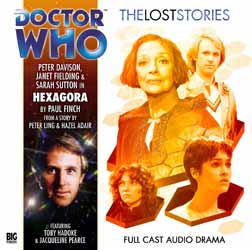|
Click here to return to the main site. Audio Drama Review
While visiting her home town of Brisbane, Tegan Jovanka discovers that a former boyfriend, a newspaper reporter called Mike Bretherton, has gone missing. She, the Doctor and Nyssa soon uncover a case of alien abduction. The trail leads them to the planet Luparis, and a city that appears to be a replica of Tudor London. What are the monsters that lurk in the shadows, and what is the terrible secret that lies at the heart of Luparis? In order to save a world, the Doctor must try to defeat the schemes of Queen Zafira - and one of her plans is to marry him... In common with The Elite, the previous Lost Story in this series, Hexagora did not reach the full script stage when it was submitted to the television production team in the 1980s. Therefore, writer Paul Finch had a fairly free hand when it came to adapting Peter Ling and Hazel Adair’s original storyline into a four-part audio adventure. Even so, the end result differs quite substantially from previously published synopses of this tale, in which, for example, Queen Zafia [sic] is a Time Lady, and the principal kidnap victim is a professor rather than Tegan’s old flame. Admittedly, the abduction of scientists has been done before, in The Time Warrior. Some of the differences might be explained by the fact that Ling and Adair’s submission went through at least three versions when it was pitched for television: a six-part Peter Davison serial, a four-part Davison serial, and a two x 45-minute adventure for Colin Baker’s Doctor. The title has also been changed from its original Hex, to avoid confusion with the Big Finish character of the same name. A common thread throughout all versions is the notion of the Doctor getting engaged. The idea isn’t so surprising nowadays (David Tennant and Matt Smith’s Doctors have been married on- or off-screen at least three times in recent years), but it certainly would have been back in the 1980s (when the fake title The Doctor’s Wife was sufficiently sensationalist for producer John Nathan-Turner to use it as a means of smoking out a mole in the production office). In context, as part of a Peter Davison story, the Doctor’s betrothal still makes for some dramatic scenes. Other ideas, such as the duplicate Tudor England and the true nature of certain insectoid beings, are even wackier, but they are developed somewhat less successfully. They all fit together quite beautifully in Part Four, and Finch makes some good points about human nature along the way, but the ultimate resolution is disappointingly swift and easy. Among the guest cast, Jacqueline Pearce (Blake’s 7, The Two Doctors) stands out as Queen Zafira. In a rare instance of timeless casting, Pearce fits the regal role as perfectly now as she would have done back in the ’80s. Toby Hadoke (Moths Ate My Doctor Who Scarf, Robophobia) is vocally dexterous in multiple roles, though I wasn’t entirely convinced by his Australian accent as Mike Bretherton. It doesn’t help that he has to deliver a stereotypical line involving a barbie and some beer. The regulars are dependable as ever, tackling a script that, for a change, acknowledges the differing social status of Tegan (Janet Fielding) and Nyssa (Sarah Sutton). Simon Robinson’s incidental music doesn’t quite get the period right, often sounding more like the work of Keff McCulloch during Sylvester McCoy’s time than any Davison-era composer. Another track seems to begin with the opening notes from the theme to Emmerdale Farm! (I know there’s a soap-opera connection with the writers Ling and Adair, but they created Compact and Crossroads, not Emmerdale.) All in all Hexagora is interesting, but, unlike the Doctor, I wasn’t entirely engaged by it. 6 Richard McGinlay |
|---|

